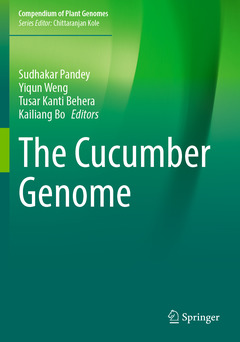The Cucumber Genome, 1st ed. 2022 Compendium of Plant Genomes Series
Coordonnateurs : Pandey Sudhakar, Weng Yiqun, Behera Tusar Kanti, Bo Kailiang

This edited book presents the latest research on cucumber, its genetic resources and diversity, tissue culture and genetic transformation, mapping of economic genes and QTLs, whole genome sequencing, comparative genomics, and breeding strategies. The mechanism of sex expression, interspecific hybridization, and cell biology are also described. The book discusses the genome draft of cucumber and the application of genome editing.
This book is useful to the students, teachers and scientists in academia and relevant private companies interested in horticulture, genetics, breeding, and related areas.
Dr. Sudhakar Pandey has 21 years of experience in vegetable breeding particularly on cucurbit crops and is presently working as a principal scientist at ICAR-Indian Institute of Vegetable Research, Varanasi. He has made significant contributions on the improvement of cucurbitaceous vegetables and was instrumental in developing 17 varieties in different cucurbitaceous vegetable crops. He is working mostly on genetics and molecular breeding of cucumber, pumpkin, and ash gourd. Dr. Pandey identified and characterized a new gene SH1 (SHORT HYPOCOTYL 1) responsible for regulating hypocotyl elongation in cucumber. His work on new SSR markers and QTLs for powdery mildew resistance and parthenocarpy fruit set in cucumber is widely cited. As a co-nodal officer of DUS on cucurbits and member of Taskforce, he developed DUS Testing Guidelines for pumpkin, cucumber, bottle gourd, bitter gourd, muskmelon, watermelon, and pointed gourd. He published over 75 research papers as author and co-author and 03 books. He is the recipient of prestigious awards like, ICAR Outstanding Multidisciplinary Team Research Award, Dr. Kriti Singh Life Time Aachievement award,Distinguished Agriculture Scientist Award (Horticulture), Young Scientist Award and Scientist of the Year. He is a fellow of National Academy of Agricultural Sciences, India, and Uttar Pradesh Academy of Agricultural Sciences, Lucknow.
Dr. Yiqun Weng is a research geneticist in the USDA-ARS Vegetable Crops Research Unit, and Professor of the Horticulture Department, University of Wisconsin at Madison, Wisconsin. He is a principal investigator for the USDA Cucumber Improvement Program focusing on cucumber germplasm enhancement. Research interests in his program include developing genetic and genomic resources for marker-assisted breeding, molecular
Date de parution : 12-2022
Ouvrage de 199 p.
17.8x25.4 cm
Date de parution : 12-2021
Ouvrage de 199 p.
17.8x25.4 cm



